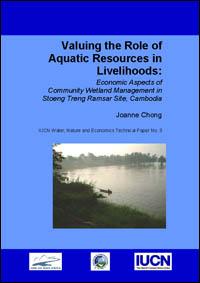Wetlands are vital to the livelihoods of hundred of millions of people residing in the Lower Mekong region, and particularly to the food security of many of the rural poor. This document reports on a study whose aim was to provide guidance on the use of environmental economic assessment methodologies to support wetlands management for poverty alleviation. Village-level economic valuation techniques were employed to conduct livelihoods assessments in Veun Sean, one village within the Stoeng Treng Ramsar site, in order to draw more general conclusions about wetland resource use and management. The study extended beyond quantitative assessment to explore the context in which resource-use decisions are made and the linkages between poverty and the importance of wetland resources.
Includes bibliographic references

